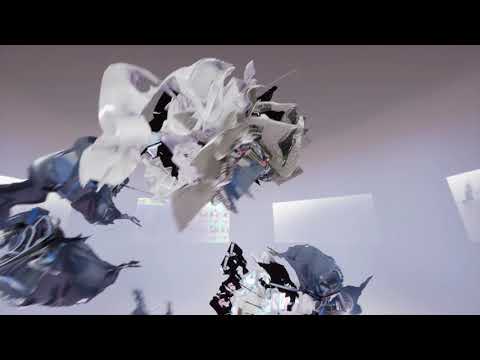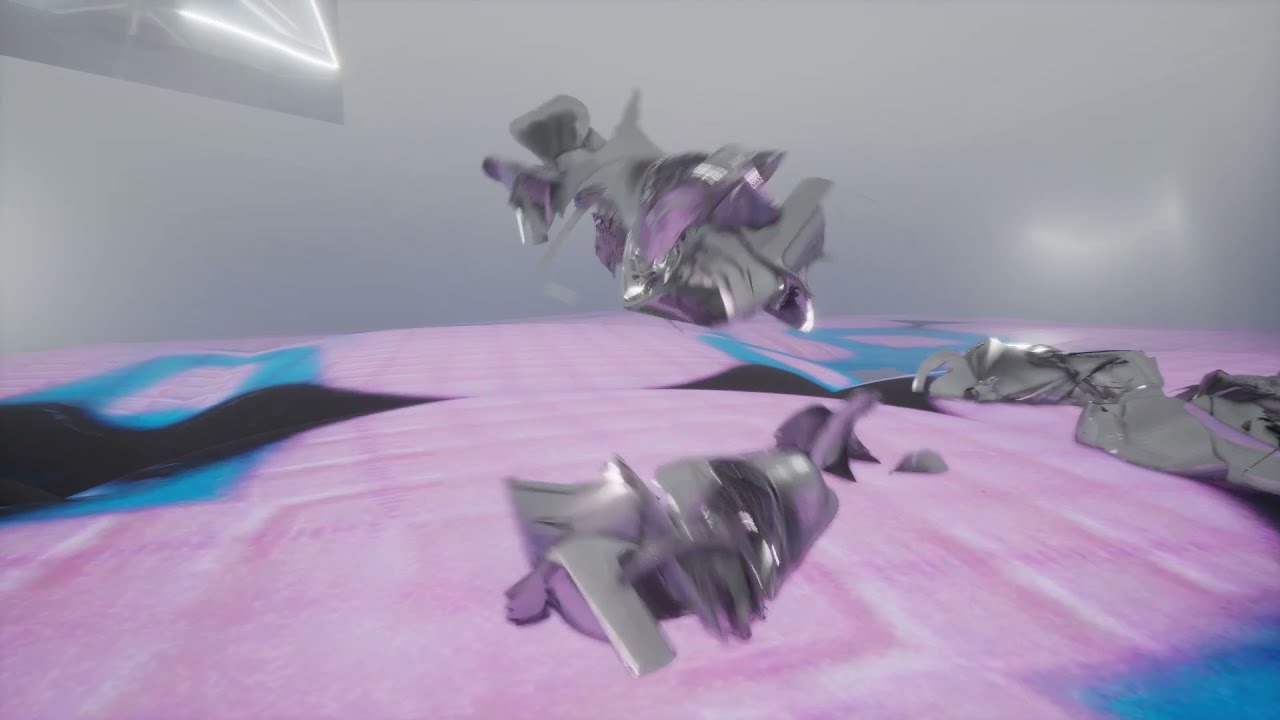A couple of days before I’m due to interview Lee Gamble, I stumble across a short documentary about Birmingham on Youtube, which, for some inexplicable reason, is narrated by Telly Savalas, star of the American cop series Kojak. Made in 1981, Telly Savalas Looks At Birmingham features the smooth-talking actor enthusing about the city’s architecture, roads and train stations, painting the Midlands city as the epitome of futuristic urbanism. “I found the city exciting. The modern buildings reflect its position as the nation’s industrial powerhouse. You feel as if you’ve been projected into the 21st century”, says Savalas. I ask Gamble, a Birmingham native, if any of that description of his hometown resonates with him. It turns out he has a slightly different take on the city. “Birmingham is a hyper-consumerist city", he says. “It’s a really working class city. It’s perfect to sell consumer stuff to people who have to work all the time”.
The constant state of information overload, and how this dovetails with popular culture and patterns of consumption, has become a central theme in Gamble’s work as an electronic music producer. “I grew up in a working class culture and often working class cultures can be quite aspirational. I’m not speaking for everyone, but you kind of want to get some stuff, you want to be seen”, he says. He also spent around two decades living in London, which only deepened his sense of ambivalence about the effects of city living.
“I lived in Wood Green for 15 years. Every day I’m walking out and you’re just hit – the first thing you see in the morning, it’s like [WH] Smith’s, Sainsbury’s, Gregg’s. You’re sold at, you’re immediately in the consumer world.” These feelings of being ceaselessly bombarded with consumer messaging, both online and offline, began to take a toll on his own wellbeing, but also started to shape his creative output.
Gamble, who has long worked in the fringes between club culture and experimental sound design, had begun exploring some of these ideas on 2017’s Mnestic Pressure, his first release on Hypderdub. But these themes have been foregrounded even further on Flush Real Pharynx, a sprawling set of releases that is arguably his strongest and most complex work to date. Produced between 2019 and 2021, the series is split into three albums – In A Paraventral Scale, Exhaust and A Million Pieces of You – which examine a state of escalating emotional and psychological turmoil in response to the extreme social and political conditions that increasingly shape our lives.
When I get a chance to speak to Gamble his upbeat but rapid speech, interspersed with drags on a vape, perhaps reflects his restless imagination. The pandemic has given him chance to reflect: “If you think about a walk down the high street, it’s like flicking through a fucking Instagram feed. I’m not saying you’re taking it all in, but it’s there. When I started travelling, I realised that not all countries are quite like that. I’m not talking about New York. I’m talking about other places – they’re not as hyper capitalistic, so they don’t have that consumerist violence.”
In A Paraventral Scale, was shaped by a fascination with the aesthetics of consumerism and an examination of how the psychological manipulation of desires created by advertising is reflected in both the material and the digital spheres. “I was looking at these Jeff Koons balloons a lot. I had them all on my wall”, he says of the controversial American artist and sculptor. “He made this thing called Dom Perignon Balloon Venus, which is this balloon sculpture — incredibly reflective, high gloss, seamless — and inside it’s there’s a bottle of wine. It’s this really super clean object that you just want to look at and touch.”
Major companies such as Telsa and Apple produce consumer objects in a similar way, be believes. “Apple are really good at it. They have these computers that just look so perfect and seamless. You can almost smell them off the screen. I wanted it to feel like that. It’s kind of disgusting, really”, he says, meaning that “when you see a Mac, it looks beautiful but it’s also hyper fucking extractive – where it’s mining its stuff from to build it, in poorer countries. That’s all hidden. All you get is the sheen.” Wanting to reflect this sheen sonically meant that In A Paraventral Scale features particularly intricate and polished sound design. “I was using FM synthesis a lot, which is super clean. A lot of physical modelling synthesis”, he says, in reference to the process of generating waveforms through complex mathematical equations.
There is also a fixation with physical objects, particularly cars, and how these come to represent a seductive and malicious energy akin to that of a serpent. “My dad was a bus mechanic. He did cars all the time so I was always seeing these exploded diagrams of cars. Also my nan and granddad live next to Spaghetti Junction”, Birmingham’s infamous motorway interchange. “When I’m working with [animation software] Unreal Engine, I’m basically taking the physics of snakes and putting them inside cars. I just thought it was a really nice metaphor, hence it’s called In A Paraventral Scale, meaning the record’s in the scale of a serpent, or something like that. But snakes don’t have any sound, so cars sound better than snakes.”
The track ‘BMW Shuanghuan X5’ explored one car in particular. “So there’s a BMW X5 and there’s a company called Shuanghuan. I think they’re from Shenzhen. They basically made a car that was a BMW X5, but they made it a lot cheaper. BMW sued them.” This simulation of an already hyperreal object seemed to exemplify much of what he was thinking about. “I took these recordings of these supercars, analysed them, extracted the data. So once you get these Doppler Shifts, I just basically attached that to synthetic violin sounds, viola sounds, things like that. So what you get is this sound of a car that actually is a violin.”
If In A Paraventral Scale was marvelling at the seductive power of consumerism, its follow up Exhaust was all about giving in to that seduction, submitting to the excitement of consumption. “There’s something about consumerism that’s super fun, right? You get dopamine, you want to go and buy, everyone does. I consider myself a lefty, but I’m not going to not buy. I’m involved. I’m inside this system, I’m not outside of it somewhere”, Gamble explains. Exhaust channels this escapist impulse into the most sonically challenging of the three albums, while his research process relied on a similar overstimulation of the senses. “I think of it almost like method acting. You bombard yourself with ideas about something — online culture, human exhaustion, burnout, consumerism — and then just think about that a lot, listen to podcasts, read books, write. Then when you start coming in [the studio] and hitting things, it’s in the front of the brain”.
Having charted the emotional toll of being embedded in a hyper-capitalist consumer culture, it was perhaps inevitable that the final part of the series, A Million Piece of You was imbued with the effects of emotional exhaustion and burnout. Gamble returned to his teenage years in Birmingham to explain the sensation of being locked into a toxic environment and needing to escape from it. “I worked in a factory making hose pipes. They’re called Hozelock, for watering your garden. I worked there as an assembly operative on a production line. I was on this machine every day – I’d get in at 5:45 in the morning. I was basically like a physical augmentation of the machine.” This experience in a “relentless, brutal environment”, eventually took its toll. “I was there for about 18 months, and I couldn’t do it anymore”, he says. Gamble felt the same sense of exhaustion and an urgent need to stop and reset during the past year. “That’s what happened with the pandemic – it was like this enforced pause”, he says. “I was just so anxious. I lost three people in my family in that period, and then last month I lost my dad as well, so it’s been a really heavy record to make, the last one especially.”
Despite the tragedy of losing a parent in the midst of an already overwhelming year, Gamble managed to continue working on the album, finding that there were overlaps between the process of grieving and exploring the effects of technology. “Technology kind of rewires your brain, but so does death”, he explains, seeing parallels between how both processes can fundamentally alter a person’s sense of self. This was something he’d been thinking since incorporating aspects of machine learning into his composition process. “I’ve always looked into technology. When I was doing computer music back in the 2000s, you’d always be looking for forms of synthesis that were super cutting edge. These are academic types of music. They start off with some genius person building a physical modelling synthesis system, and then eventually a big company will have it and then you can buy it, you can repeat it."
Despite some reservations about the technology, he began to see its uses from a musical perspective. “I ended up making this deep fake kind of voice of myself, which was kind of interesting to do”, he says. “Basically you just record yourself speaking, that’s the data set, and then you build a model which will mimic that.” The implications of this began to take on new meaning while processing his dad’s passing, when something so integral was taken from him. “We’re constantly being mined for information, extracted from. That’s what the deep model of my voice does – it just extracts tonality. I teach it a few things and then it goes, ‘Okay, I can replicate that.’ It also felt kind of pertinent because of the loss that I’d felt.” He describes this feeling of loss as “the laceration of the individual”, a similar process to what happens when our personal data is mined for profit.
Despite the intensity of the composition process, does he feel some sort of closure from having finished this cycle of work? “The album’s called Flush Real Pharynx 2019 – 2021. I needed to put that time frame on it, because in 20 years time, I want to look at that go, ‘What was happening?’ Whether that works or not, I don’t know. But I’ll never do it like this again. It’s been an absolute hell to make. I really mean that. So the next one, I’m just chilling, man. I’m just going to fucking play some piano and relax.”
A Million Pieces Of You, the final part of the Flush Real Pharynx series, is out now on Hyperdub




